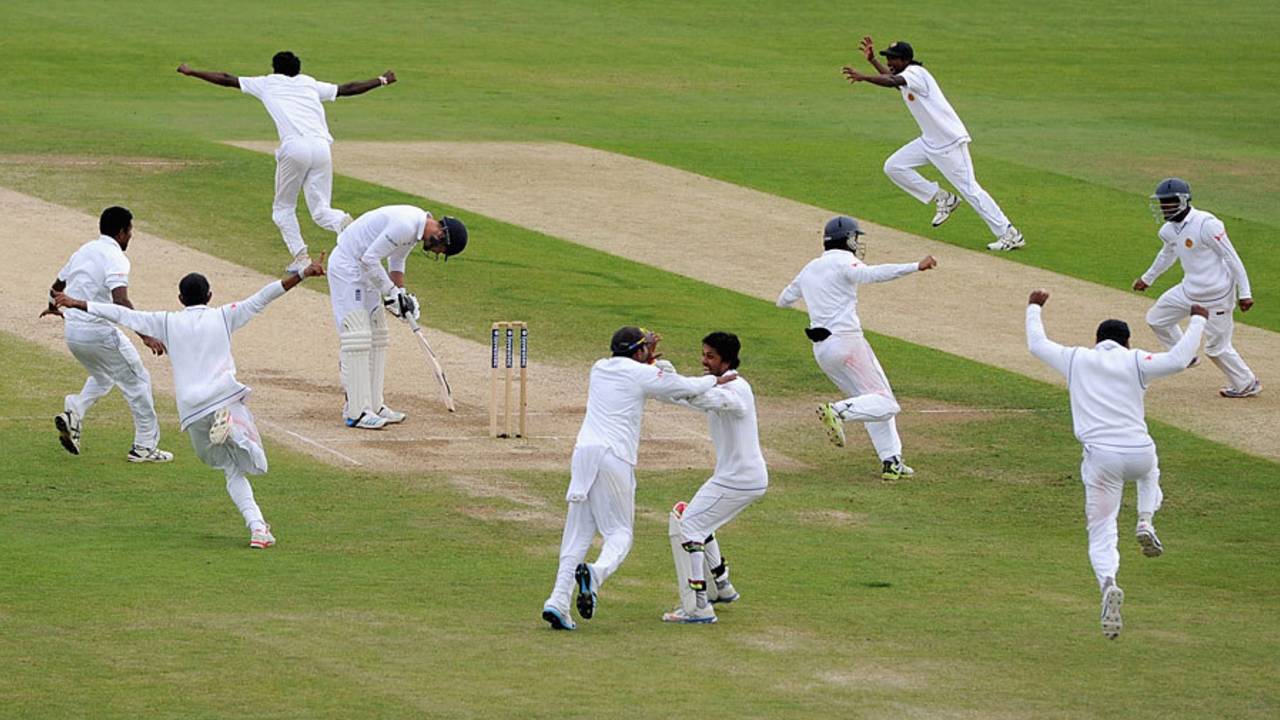Cricket committee split on four-day Tests
The MCC cricket committee spent much time debate four-day Test cricket and could not come to a consensus
Sidharth Monga
08-Dec-2016
Sri Lanka celebrate victory at Headingley in 2014 which they clinched off the penultimate ball of the fifth day • Getty Images
Test cricket is an anomaly in the modern world; after 30 hours of scheduled play you can still end with a draw. Of late, though, it has been under immense pressure to cut some flab, especially from the broadcasters who practically finance the game.
The proposal is to bring it down to four days, allowing them to schedule it to start on Thursday and finish on the weekend. The MCC world cricket committee recognised the pressure on the format in its meeting in Mumbai, but it finished split down the middle when it came to removing a day from Tests.
Two of the cricketers on the committee, Ricky Ponting and Ramiz Raja, were personally in favour of keeping the format as it is but they recognised the need for changes. "We have had two days of meetings, and to be fair we spent more time as a committee debating this four-day comparison to five-day Test cricket," Ponting said.
"It is pretty fair to say that the committee was probably split right down the middle as far as understanding and identifying that the Test game does need some changes. Things have to change to try and make the Test game more attractive but also we are trying to protect the fabric of Test match cricket.
"Personally, I am very much in favour of five-day Test cricket and we only have to look back at the last 12-18 months and see how many great five-day Test matches there have been. But other guys in the committee would also like to see a trial of four-day Test cricket."
Raja acknowledged he saw the benefits of a shorter Test format, but still favoured the existing model. "It is a difficult debating point," he said. "One big advantage with a four-day Test match is that it improves the pace of Test cricket, and there will be exciting declarations and something out of the ordinary, which may give new lease of life to Test cricket.
"But my biggest grief was that the lesser teams would get away with murder, they would be able to draw a game and in Test matches the best teams should win all the time, so that limited that possibility. Four-day cricket is exciting, it gives ample opportunity to broadcasters to get the peak days…end it on Saturday or Sunday, which could be great watching.
"But I was also in favour of five-day cricket because it has a lot of history, it is traditional and we should not tamper with a format, which has been delivering the goods. In the last year and a half, we have seen some exciting cricket."
Ponting touched upon possible complications that might arise from the pressure on the pitches to deliver outright results.
"If we ever go to a stage where four-day Test was the way we are going, a lot of it will be down to how the wickets are prepared," he said. "The one thing we don't want is more draws. No one wants to see more drawn games. We want to see entertaining Test matches be it over four or five days.
"That's what we have seen of late. Very aggressive cricket when needed, very defensive when needed as well. One of the pros for four-day Tests is every Test potentially starting on Thursday and finishing on Sunday. Maybe it frees up a few more days in the international schedule. But I am all for keeping it as it is. It's the way I learned playing the game. It's the game we all enjoy playing over five days."
In its press release, the MCC cricket committee outlined what they considered the pros and cons of the four-day Test debate
Pros
Cons
Sidharth Monga is an assistant editor at ESPNcricinfo
